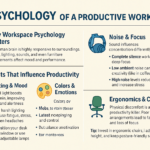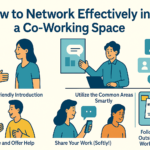
In the wake of remote work, digital entrepreneurship, and hybrid job models, the global work culture has undergone a massive shift. No longer tethered to traditional office spaces, individuals and companies are turning to co-working spaces—a new-age solution redefining the way we work.
But what exactly makes co-working the future? Here’s an in-depth look at 10 compelling reasons why co-working spaces are not just a trend—but a transformative force in modern work culture.
1. Flexibility That Adapts to Evolving Workstyles
One of the primary advantages of co-working spaces is the flexibility they offer. Whether you’re a freelancer who needs a desk for a few hours or a startup looking for a scalable office setup, co-working memberships adapt to your business lifecycle.
🟦 Hot desks, dedicated desks, private cabins, and virtual offices—professionals can choose what suits them best without long-term lease commitments.
This flexibility supports the rise of hybrid and remote work models that have become the new standard.
2. Cost-Effective Operations for Individuals and Businesses
Maintaining a traditional office comes with overheads: rent, utilities, internet, maintenance, security, furnishings—the list goes on. Co-working spaces bundle all these costs into affordable monthly or hourly plans, offering high-end office amenities without the financial burden.
📉 Startups, SMEs, and even large corporations are opting for co-working to reduce capital expenditure and redirect resources into core business areas.
3. A Catalyst for Networking and Collaboration
In a co-working space, you’re surrounded by like-minded professionals, entrepreneurs, freelancers, and remote workers across industries. This creates an environment ripe for spontaneous collaboration and organic networking.
🤝 Shared spaces encourage partnerships, business referrals, skill exchanges, and even mentorship opportunities—an invaluable advantage in today’s interconnected economy.
4. Enhanced Productivity in a Distraction-Free Zone
Home offices, cafés, and public libraries often lack structure and consistency. Co-working spaces are designed for productivity, featuring quiet zones, well-lit workstations, and ergonomic furniture to keep you focused and comfortable.
✅ A professional work setting boosts accountability and minimizes distractions—ideal for maintaining consistent work output.
5. Access to Premium Infrastructure and Amenities
From high-speed internet and tech-enabled conference rooms to printing services, mail handling, pantry facilities, and concierge support—co-working spaces come equipped with all the tools needed to run a business efficiently.
🏢 Some spaces also include podcast studios, creative labs, photography zones, and event halls to support specialized industries.
6. Work-Life Balance and Wellness Integration
Unlike conventional offices, many co-working operators prioritize wellness by integrating mental health breaks, relaxation areas, yoga zones, and wellness events.
🧘♀️ Whether it’s attending a mid-day meditation session or grabbing a healthy smoothie post-work, the ecosystem supports a more holistic lifestyle.
This focus on wellness improves job satisfaction, reduces stress, and boosts overall employee morale.
7. Tech-Ready and Scalable for Growth
Modern co-working spaces are tech-savvy and scalable. With tools like biometric access, booking apps, cloud-based storage solutions, and remote monitoring, they provide a future-proof infrastructure.
⚙️ As your team grows, you can scale up your office footprint instantly—without the hassle of relocation or new leases.
8. Built-In Community and Culture
Isolation is a common downside of remote work. Co-working spaces counter this by creating a community-oriented culture with regular events, workshops, seminars, and informal meetups.
🌐 This fosters a sense of belonging, keeps professionals engaged, and allows them to build meaningful relationships—both personal and professional.
9. Sustainability Through Shared Resources
Co-working aligns with sustainable practices by promoting shared resources and optimized space utilization. With fewer empty desks and better energy efficiency, they contribute to reducing the overall carbon footprint.
🌱 Many spaces now follow green practices—using solar panels, recycling stations, and energy-efficient appliances—making them environmentally responsible choices.
10. Tailor-Made for Freelancers, Startups & the Gig Economy
With the gig economy projected to account for over 50% of the global workforce in the coming years, co-working spaces are perfectly aligned to support freelancers, consultants, and digital entrepreneurs.
🚀 They offer credibility (via business addresses), support services (legal, HR, tech), and community access, which are essential for independent professionals.




Leave a comment